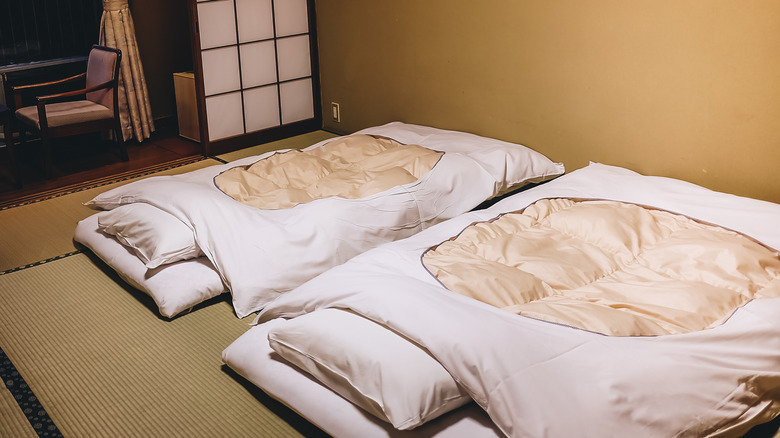Is Sleeping On The Floor Bad For You?
Chances are, you've taken a nap or spent a night sleeping on the floor. It may be your only option during a move, or maybe you've taken to the rug after a fight or while in college. It's usually temporary. Falling asleep atop a nice soft bed with multiple blankets and comforters is the norm in the United States.
But there are those who have willfully left the comfort of their beds to slumber on the floor permanently. Why give up your bed? For the health benefits, say the floor-sleepers. That's right, there are benefits to sleeping on the floor — at least according to those who choose to do it.
Actual clinical research specifically looking at the health advantages of floor-sleeping is scant. The "proof" appears to be mostly anecdotal (per Medical News Today). But if we keep an open mind about the joys of slumbering on a hard floor, there may be some things to learn.
What exactly is "sleeping on the floor?"
Let's be clear about what floor-sleeping is. It's not snoozing on a mattress that's on the floor, and it's not necessarily lying on a bare floor, with nothing under you. Sleeping on the floor often involves a cushion between you and the hard surface, and there are many options (via The Sleep Judge).
One is the tatami, a Japanese mat that traditionally has a rice straw core and a soft covering. Nowadays, polystyrene foam is at the core. Tatamis were invented by the Japanese over 1,200 years ago as a sleeping surface. They vary in thickness and have a little give when pressed. One modern alternative is the futon. They tend to be thicker, but not too thick that they negate the benefits of sleeping on a hard surface.
Other options are yoga or massage mats. Yoga mats are soft and inexpensive for a basic model. If you're interested in testing out floor-sleeping for yourself, they're an affordable way to go. Massage mats come in a variety of sizes but are generally thin enough for floor-sleeping. One bonus is that some have a heating feature, which can make sleeping on a cold floor toasty. As for pillows, you can choose to not use one, or you can have a thin one to support your head and neck.
The benefits of sleeping on the floor
Even though there hasn't been enough research on floor-sleeping, devotees are passionate about its benefits. For instance, people who suffer with back pain claim it reduces discomfort. The thinking is that the hard surface forces your body to stay in alignment, keeping your neck and spine straight (via The Sleep Judge). Sleeping on a mattress, on the other hand, allows you to sink in and may lead to back pain by causing your spine to curve, according to Healthline. Because your body stays in alignment during floor-sleeping, it may also improve your posture. People who slouch may do so due to sleeping for long periods of time on a mattress offering no support.
If you think that sleeping on the floor leads to insufficient rest, that may not be the case. Floor-sleepers say they feel more rested and ready to get up in the morning. You know how comfy you feel lying in your bed? Is it any wonder you hit the snooze button multiple times? Yes, you feel more comfy on a mattress, but it can be too comfortable. You don't want to get up.
Floor aficionados say their approach offers the best quality of rest — you feel comfortable while asleep but not so much that you want to stay there when the alarm goes off. Sleeping on the floor also offers cooler air for those who tend to overheat in bed, thanks to the laws of physics (via Medical News Today).
The possible downsides of floor-sleeping
Being so close to the floor for hours at a time may be a problem for some, such as people with allergies. The proximity to the bare floor means increased exposure to dust and dirt (via Medical News Today). And if the floor is carpeted, allergens like molds and dust mites collect in the fibers (via Healthline). Floor sleepers with allergies may experience sneezing, runny nose, itchy eyes, coughing, wheezing, rash, or trouble breathing.
Those who tend to get cold during sleep may not do well on the floor. Being chilly all night can cause disrupted sleep, especially during the winter and when floors are made of tile or concrete, which hold less warmth than wood (via The Sleep Judge). While there are those who claim back pain is reduced by sleeping on the floor, there are others who say the opposite. So listen to your body — it will let you know if floor-sleeping is for you.




